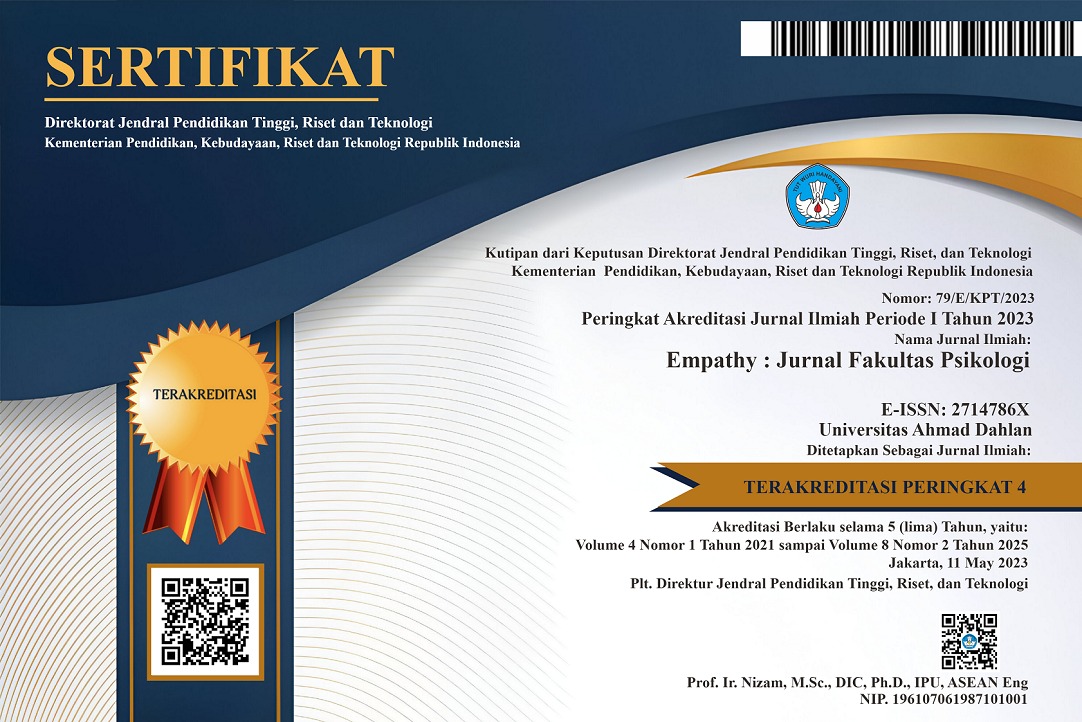Peer Support, School Well-Being, Student Engagement Siswa SMP X Denpasar di Masa Pandemi Covid-19
DOI:
https://doi.org/10.12928/empathy.v5i1.23073Keywords:
Peer support, School well-being, Student engagement.Abstract
Peer Support, School Well-Being, Student Engagement at Student SMP X Denpasar during Pandemic Covid-19
The purpose of the present study was to examine the relationship between peer support and school well-being with student engagement during covid-19 pandemic. This research method uses a quantitative approach with measuring instruments on the peer support scale, school well-being scale, and student engagement scale. The research subjects were 99 students of JHS students. The data were analysis technique in this study used multiple regression analysis and partial correlation with SPP 24.0 for windows. The result of analysis obtained R of 0.746 with significance level of 0.000 (p > 0.05) meaning that there is a very significant relationship between peer support and school well-being with student engagement. The results of the analysis can be concluded that there is a very significant relationship between peer support, school well-being, and student engagement in junior high school students during covid-19 pandemic with an effective contribution of 55.7%.
References
Anugrahana, A. (2020). Hambatan, solusi dan harapan: pembelajaran daring selama masa pandemi covid-19 oleh guru sekolah dasar. Scholaria: Jurnal Pendidikan Dan Kebudayaan, 10(3), 282–289. doi: 10.24246/j.js.2020.v10.i3.p282-289
Appleton, J. J., Christenson, S. L., & Furlong, M. J. (2008). Student engagement with school: critical conceptual and methodological issues of the construct. Journal of Psychology in the Schools, 45(5), 369–386. doi: 10.1002/pits.20303
Boulton, C.A., Hughes, E., Kent, C., Smith, J. R., & Williams, H. T. P. (2019). Student engagement and wellbeing over time at a higher education institution. Journal of Plos One, 14(11), 1-20. doi: 10.1371/journal.pone/0225770
Chambers, D., Scala, J., & English, D. (2020). Promising practices brief : improving student engagement and attendance during covid-19 school closures. Paper presented at Insight Policy Research, Department of Educational National Technical. US, 1–28.
Febriyana, F., Supraptiningsih, E., & Hamdan, S. R. (2019). Hubungan antara school well-being dengan student engagement pada siswa SMK X Bandung. Psosiding Psikologi, 5(1), 167–172.
Fredricks, J. A., Blumenfeld, P. C., & Paris, A. H. (2004). School engagement: Potential of the concept state of the evidence. Review of Educational Research, 74(1), 59–109. doi: 10.3102.2F00346543074001059
Fredricks, J.A., Reschly, A. L., Christenson, S. L., & Larson, Sue. (2019). Handbook of student engagement interventions: working with disengaged students. New York: Springer.
Gibbs, R., & Poskitt, J. (2010). Student engagement in the middle years of schooling (year 7-10). Literature Review od Report to The Ministry of Education. New Zealand. Retrieved from www.educationcounts.govt.nz/publications
Higgins, E. T. (2006). Value from hedonic experience and engagement. Psychological Review, 113(3), 439–460. doi: 10.1037/0033-295X.113.3.439
Hughes, K. (2015). Impact of student engagement on achievement and well-being. A Literature Review of Prepared for the Ottawa-Carleton District School Board By ResearchGatete. 1–39. doi: 10.13140/RG.2.1.2536.3684
Jani, A. A. (2017). Hubungan teacher support dan student engagement pada siswa SMA. Skripsi diterbitkan. Fakultas Psikologi dan Ilmu Budaya, Yogyakarta.
Konu, A., & Rimpelä, M. (2002). Well-being in schools: a conceptual model. Journal of Health Promotion International, 17(1), 79–87. doi: 10.1093/heapro/17.1.79
Lu, H. (2020). Online learning: the meanings of student engagement. Journal of Education Science Publishing Group, 9(3), 73-79. doi: 10.11648/j.edu.20200903.13
Miller, R. L., Rycek, R. F., & Fritson, K. (2011). The effects of high impact learning experiences on student engagement. Procedia - Social and Behavioral Sciences, 15, 53–59. doi: 10.1016/j.sbspro.2011.03.050
Mustika, R. A., & Kusdiyati, S. (2015). Studi deskriptif student engagement pada siswa kelas xi ips sma pasundan 1 bandung. Prosiding Psikologi. 244–251.
Ormrod, J. E. (2009). Psikologi pendidikan membantu siswa tumbuh dan berkembang jilid 1. Jakarta: Erlangga.
Rusman, A. A. & Nasution, F. (2020). Deskripsi kebahagiaan belajar mahasiswa BKI pada masa pandemi covid-19. Jurnal Al-IRSYAD, 10(1). 1-7
Sa’diyah, S. K., & Qudsyi, H. (2016). Peer support and student engagement among high-school students in Indonesia. International Conference on Education, Psychology, and Social Sciences (ICEP), 309–321. Retrieved from http://doi.apa.org/getdoi.cfm?doi=10.1037/0022-0663.99.1.83
Solomon, P. (2004). Peer support / peer provided services underlying processes, benefits , and critical ingredients. Journal of Psychiatric Rehabilitation, 27 (4), pp. 392–401.
Sukmadinata, N. S. (2015). Metode penelitian pendidikan. Bandung: PT Remaja Rosdakarya Offset.
Downloads
Published
Issue
Section
License
Authors who publish with Empathy: Jurnal Fakultas Psikologi agree to the following terms:
- Authors retain copyright and grant the journal right of first publication with the work simultaneously licensed under a Creative Commons Attribution License (CC BY-SA 4.0) that allows others to share the work with an acknowledgment of the work's authorship and initial publication in this journal.
- Authors are able to enter into separate, additional contractual arrangements for the non-exclusive distribution of the journal's published version of the work (e.g., post it to an institutional repository or publish it in a book), with an acknowledgment of its initial publication in this journal.
- Authors are permitted and encouraged to post their work online (e.g., in institutional repositories or on their website) prior to and during the submission process, as it can lead to productive exchanges, as well as earlier and greater citation of published work.

This work is licensed under a Creative Commons Attribution-ShareAlike 4.0 International License.



